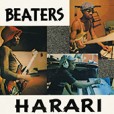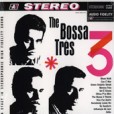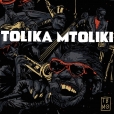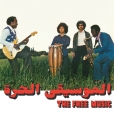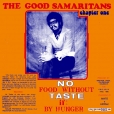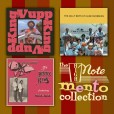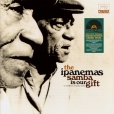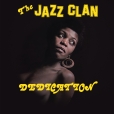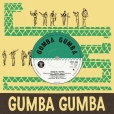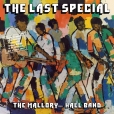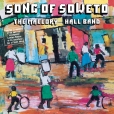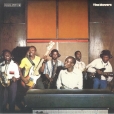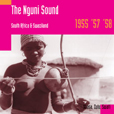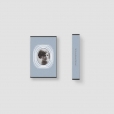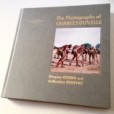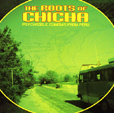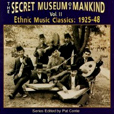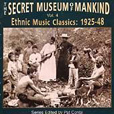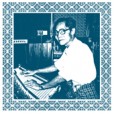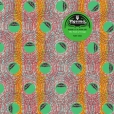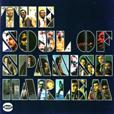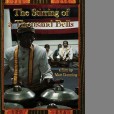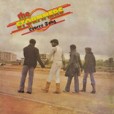Your basket is empty

The Beaters started out amidst the Soweto Soul explosion, inspired by the music of Stax and Motown. They supported the likes of Percy Sledge and Timmy Thomas. During a three-month tour of Zimbabwe (then Rhodesia), they were inspired by the strengthening independence struggle, and musicians such as Thomas Mapfumo, drawing on African musical styles and traditions. Back home in Johannesburg, they swapped their Nehru jackets for dashikis, and grew Afros. Their new Afro-centric rock and funk transformed the SA scene. Black Power in music, to get you on the good foot. ‘During apartheid times we made people laugh and dance when things weren’t looking good,’ remembers drummer Sipho Hotstix Mabuse.
Here, Love Love Love retains the influence of US soul, whilst Harari, Inhlupeko Iphelile, Push It On and Thiba Kamoo encapsulate the new direction; with a bump-jive workout, fired up by Kippie Moeketsi and Pat Matshikiza, to close.
Brothers Nkululelo and Siyabonga Mthembu reworkimg the music of Mongezi Feza, Johnny Dyani, the Malopoets, Batsumi, and Philip Tabane.
Old wisdom in new voices, new wisdom in old voices. Tolika Mtoliki, ‘Interpret Interpreter’.
“Just brilliant,” says Gilles.
Magnificent Wolof drum music, performed by an extended griot family in the mystical setting of Lac Rose, outside Dakar.
Doudou Ndiaye Rose — who died in 2015 — is a key drummer in the musical history of the world. He developed a system of five hundred original drumming patterns, ancient and new. Amongst the modern rhythms here is Bench Mi — ‘under the Baobab tree,’ a spot where where problems get solved. Also Hibar Yi — ‘passing on information’ — the theme-tune of Senegalese TV national news for decades — and Les Rosettes, the signature rhythm of Senegal’s first ever all-female percussion group, convened by Doudou, and named after his grandmother.
These original compositions sit alongside important traditional rhythms, familiar to every Sabar player, such as Farwu Jar ( a courtship game sometimes resulting in a wedding), Ceebu Jin (also the name of the national dish of fish and rice), and Gumbé, often played after a successful harvest.
Recorded in joyful single takes, over seven consecutive days in February 2020, with no overdubs, mastered by Rashad Becker, the music is deep and thrilling, polyrhythmic to the bone, with a complex, pointillistic intensity at times evoking Jeff Mills in full flight.
‘One of the best, rarest and most sought after South African recordings of the early 1970s, available again for the first time since its original South African release — the tough, jubilantly swinging township groove of The Jazz Clan’s 1973 debut LP, Dedication. It captures the acoustic jazz sound of the early 1970s in its pomp — a handful of tightly wound songs jostling for space, blending uptempo soul-jazz sensibilities with Latin influences and pronounced township jazz accents, the latter especially audible in Dimpie Tshabalala’s piano vamps, Jeff Mpete’s pattering hi-hat emphases, and the unmistakably South African swagger and dip of the horns on cuts like Rabothata. It is music on the brink of a transition, looking ahead but still dedicated to the sound of the golden years, and it could have been made nowhere else on earth but in Soweto.’
Smash hits by the greatest mbaqanga girl group in history.
‘With its pulsating rhythm, sunny guitar phrases and resonant close harmony, Umculo Kawupheli — the music never ends — celebrates music as a source of joy and healing.’ As ripped off by Malcolm McLaren for Bow Wow and Duck Rock.
Handsomely presented, with original label artwork, in a printed sleeve, with new notes on the back.
Blue Mabone!
Like The Last Special, this was recorded at Johannesburg’s Video Sounds Studios in December 1974, in the depths of the apartheid era, by a twelve-piece touring band from California which immediately moved beyond the segregated hotels and ballrooms to build links with local South African players and audiences.
Featuring pianist Kirk ‘Habiba’ Lightsey, Rudolph Johnson from Black Jazz, and Billy Brooks, both records are superbly arranged slabs of peak 1970s funky big-band soul jazz, with tasteful Latin inflections and more than a nod to South Africa’s upful township jazz sound.
Try Hamba Samba!
Mostly unaccompanied singing; also with musical bows — just knockout, some of the most beautiful music there is — flutes, and guitars and concertinas.
Swaying, haunting tangos from Turkey, from the twenties to the fifties, drenched in tears and booze, regret and recrimination.
A dazzling survey of the last, bohemian flowering of the so-called Golden Era of Ecuadorian musica national, before the oil boom and incoming musical styles — especially cumbia — swept away its achingly beautiful, phantasmagorical, utopian juggling of indigenous and mestizo traditions.
Forms like the tonada, albazo, danzante, yaravi, carnaval, and sanjuanito; the yumbo, with roots in pre-Incan ritual, and the pasillo, a take on the Viennese waltz, arriving through the Caribbean via Portugal and Spain.
Exhumations like the astoundingly out-there organist Lucho Munoz, from Panama, toying with the expressive and technical limits of his instrument; and our curtain-raiser Biluka, who travelled to Quito from Rio, naming his new band Los Canibales in honour of the late-twenties Cannibalist movement back home, dedicated to cannibalising other cultures in the fight against post-colonial, Eurocentric hegemony. He played the ficus leaf, hands-free, laying it on his tongue. One leaf was playable for ten hours. He spent long periods living on the street, in rags, when he wasn’t in the CAIFE studio recording his chamber jazz-from-space, with the swing, elegance and detail of Ellington’s small groups, crossed with the brassy energy of ska — try Cashari Shunguito — and an enthralling other-worldliness.
Utterly scintillating guitar-playing, prowling double bass, piercing dulzaina, wailing organ, rollicking gypsy violin, brass, accordion, harps, and flutes. Bangers to get drunk and dance to. Slow songs galore to drown your sorrows in, with wildly sentimental lyrics drawn from the Generacion Decapitada group of poets (who all killed themselves); expert heart-breakers, with the raw passion of the best rembetica, but reined in, like the best fado.
Fabulous music, like nothing else, exquisitely suffused with sadness and soul. Hotly recommended.
Sumptuously presented, in a gatefold sleeve and printed inners, with a full-size, full-colour booklet, with wonderful photos and excellent notes. Limpid sound, too, courtesy of original reels in Quito, and Abbey Road in London; pressed at Pallas.
Chicha is the late-sixties, in-thing scrambling of traditionally-demented cumbia dance music. Uncouth electric guitar and organ join the mix, with other electronic debauchery.
A fabulous survey of early Congolese recordings, 1948-1963.
We can’t recommend it strongly enough.
Classic early-eighties Nigerian disco, fronted by Ronnie Pearl from Aktion and Jake Sollo from the Funkees.
